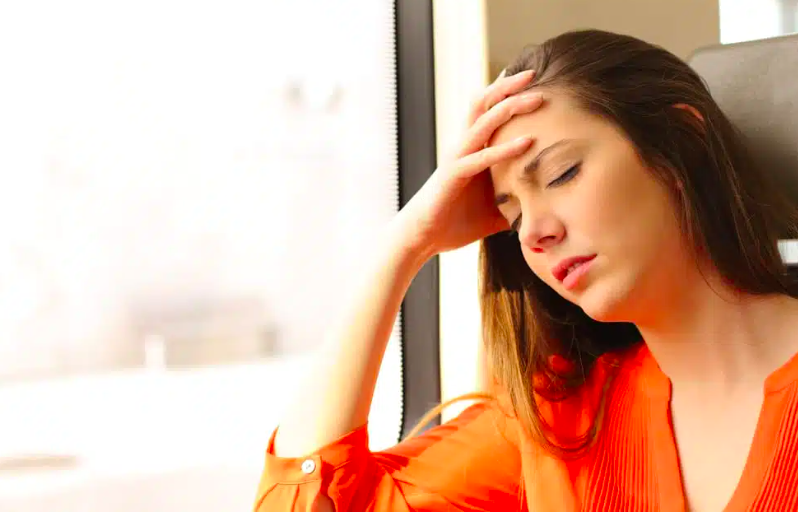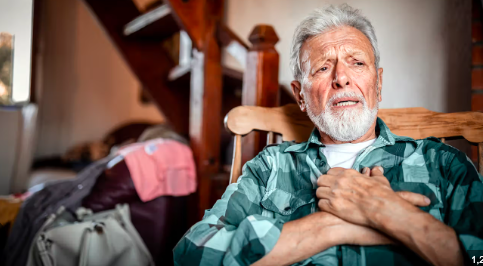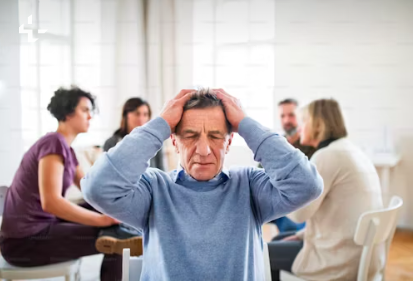Introduction: Why Fatigue Could Be More Than Just Tiredness
We’ve all experienced tiredness, whether from a long day at work or a restless night of sleep. But what happens when that feeling of exhaustion becomes a constant, nagging presence in your life? For many people, this chronic fatigue may be more than just a sign of a busy lifestyle — it could be linked to an underlying health issue, like high blood pressure.
Can high blood pressure cause fatigue? The answer is yes, and it’s a connection you shouldn’t ignore. In this article, we’ll explore how hypertension can sap your energy and the warning signs to watch for. Whether you’re managing hypertension or just trying to stay informed, understanding this link is key to taking control of your health.
1. Unexplained Tiredness: How High Blood Pressure Drains Your Energy
Can High Blood Pressure Cause Fatigue? Yes, it can. The strain on your heart and circulation from high blood pressure often leads to reduced oxygen flow to your body, causing chronic tiredness.
One of the most common signs of fatigue caused by high blood pressure is an overwhelming sense of tiredness that doesn’t seem to have a clear explanation. Unlike typical fatigue after exercise or a poor night’s sleep, this type of exhaustion feels unrelenting, even after rest. So, why does high blood pressure make you feel so tired?
When blood pressure is elevated, your heart works harder to pump blood throughout the body. This strain can reduce the efficiency of your circulatory system, meaning less oxygen is delivered to your muscles and tissues. Over time, this lack of oxygen results in feelings of fatigue, making everyday tasks feel draining. You might find yourself struggling to stay awake during the day or lacking the energy to perform routine activities.
A patient once described their experience as “feeling like I’m walking through quicksand” — and that’s a common sentiment. This chronic, unexplained tiredness is a red flag for hypertension and a sign that your heart is working too hard.
2. Dizziness and Brain Fog: Signs Your Blood Pressure May Be Affecting Your Fatigue

Fatigue linked to high blood pressure doesn’t just affect your body; it can also affect your mind. Many people with hypertension experience dizziness or “brain fog,” making it hard to think clearly or focus on tasks. These symptoms often occur in conjunction with fatigue, creating a double burden that makes it difficult to function in daily life.
But how does high blood pressure contribute to mental fatigue? When your blood pressure is consistently high, the blood vessels in your brain may not deliver oxygen as efficiently, leading to feelings of dizziness or confusion. This lack of oxygen can also cause headaches or a sense of “cloudiness” in your thinking.
Research has shown that individuals with hypertension are more likely to report cognitive issues like memory problems and difficulty concentrating. For those experiencing both brain fog and fatigue, the combination can feel overwhelming. Simple tasks, like reading or following conversations, may feel mentally exhausting, adding to the physical tiredness already present.
3. Shortness of Breath and Lack of Stamina: Could Hypertension Be the Cause?

Shortness of breath and a lack of stamina are clear signs that fatigue can be caused by high blood pressure, as the heart struggles to pump blood efficiently. You might notice that climbing a flight of stairs, carrying groceries, or even walking a short distance leaves you feeling winded and depleted of energy. If you’re experiencing this, it’s likely a sign that your cardiovascular system is under stress.
When blood pressure is elevated, the heart and lungs must work overtime to supply oxygen throughout the body. This added strain can lead to shortness of breath, particularly during physical activity. As a result, your stamina may decrease, and you might feel tired much more quickly than before. This lack of endurance can compound the sense of fatigue, making it harder to stay active and maintain energy levels.
One patient shared that they had to stop halfway through mowing their lawn because they felt “completely wiped out” — something they had never experienced before their blood pressure rose.
4. Sleep Disorders: How High Blood Pressure Can Disrupt Your Rest
If you’ve been wondering, can high blood pressure cause fatigue through sleep problems? The answer is yes—conditions like sleep apnea can disrupt your rest and worsen your tiredness.
High blood pressure is often linked to sleep disorders like sleep apnea, a condition where breathing repeatedly stops and starts during sleep. This disruption in sleep patterns leads to poor-quality rest, which in turn worsens feelings of fatigue during the day. Sleep apnea is common among those with hypertension and can exacerbate both conditions.
If your sleep is frequently disturbed, you’re likely to wake up feeling unrefreshed, regardless of how many hours you’ve slept. Over time, this contributes to daytime sleepiness, low energy, and an increased risk of complications from high blood pressure. Sleep plays a critical role in your body’s ability to repair and rejuvenate, so poor sleep quality can lead to a vicious cycle of fatigue and worsening hypertension.
5. Emotional Stress: How High Blood Pressure and Fatigue Impact Your Mental Well-being

Living with hypertension can wear you down emotionally. Fatigue can be caused by high blood pressure when mental stress adds to physical exhaustion, creating a vicious cycle.
Living with chronic high blood pressure can also take an emotional toll. Constantly feeling tired, stressed, or anxious can lead to emotional exhaustion. Over time, this emotional strain can manifest as depression or anxiety, further compounding feelings of fatigue.
Research has shown that individuals with hypertension are more likely to experience mental health challenges. The body’s response to stress, combined with the physical demands of high blood pressure, can create a cycle of fatigue and emotional burnout. It’s important to recognize that emotional well-being is closely linked to physical health — taking care of both can help reduce overall fatigue.
How to Manage Fatigue Caused by High Blood Pressure
To answer the question, can high blood pressure cause fatigue? Yes, it can, but making lifestyle changes, including exercise and better sleep habits, can help you manage both blood pressure and energy levels. If you’re experiencing fatigue due to high blood pressure, there are several steps you can take to regain your energy:
- Exercise Regularly: While it may seem counterintuitive when you’re tired, regular physical activity improves circulation, boosts energy levels, and helps control blood pressure.
- Eat a Balanced Diet: A diet rich in fruits, vegetables, whole grains, and lean proteins supports heart health and can provide a much-needed energy boost.
- Stay Hydrated: Dehydration can worsen fatigue, so make sure you’re drinking enough water throughout the day.
- Get Enough Sleep: Prioritize sleep and address any sleep disorders, such as sleep apnea, with your healthcare provider.
- Manage Stress: Incorporate relaxation techniques like meditation or deep breathing to reduce stress and improve your overall well-being.
The Role of Medication: Can Your Blood Pressure Drugs Cause Fatigue?
In some cases, fatigue may be a side effect of the medications used to treat high blood pressure. Certain beta-blockers, diuretics, and other antihypertensive drugs can cause drowsiness or reduced energy levels. If you suspect your medication is contributing to your fatigue, talk to your doctor. They may be able to adjust your dosage or recommend alternative treatments that don’t impact your energy.
Preventing Fatigue Through Better Blood Pressure Management
Prevention is key when it comes to managing both high blood pressure and fatigue. Here are some strategies for keeping your blood pressure in check:
- Monitor Your Blood Pressure: Regular blood pressure checks at home or your doctor’s office can help catch any spikes before they cause fatigue or other symptoms.
- Limit Salt and Alcohol: Both salt and alcohol can raise blood pressure, so reducing your intake of these can help prevent fatigue caused by hypertension.
- Maintain a Healthy Weight: Being overweight puts extra strain on your heart, contributing to both high blood pressure and fatigue.
When to Seek Medical Help for Fatigue
If you’re still asking, can high blood pressure cause fatigue that doesn’t go away with rest? Consult your doctor to rule out any serious complications and get the right treatment. Fatigue can be a symptom of other underlying conditions, such as thyroid disorders, anemia, or heart disease. A thorough medical evaluation can help rule out other causes and ensure you’re getting the right treatment for both your blood pressure and fatigue.
Conclusion: Take Control of Your Fatigue and Hypertension
High blood pressure doesn’t have to rule your life or drain your energy. By recognizing the warning signs and taking proactive steps to manage your blood pressure, you can improve your overall well-being and reduce feelings of fatigue. Remember, it’s important to listen to your body and consult your healthcare provider if you’re experiencing persistent tiredness. With the right care, you can regain control of your energy and live a healthier, more vibrant life.





Pingback: 7 Alarming Hypertensive Retinopathy Signs and Symptoms You Can’t Ignore - Wellnest Central